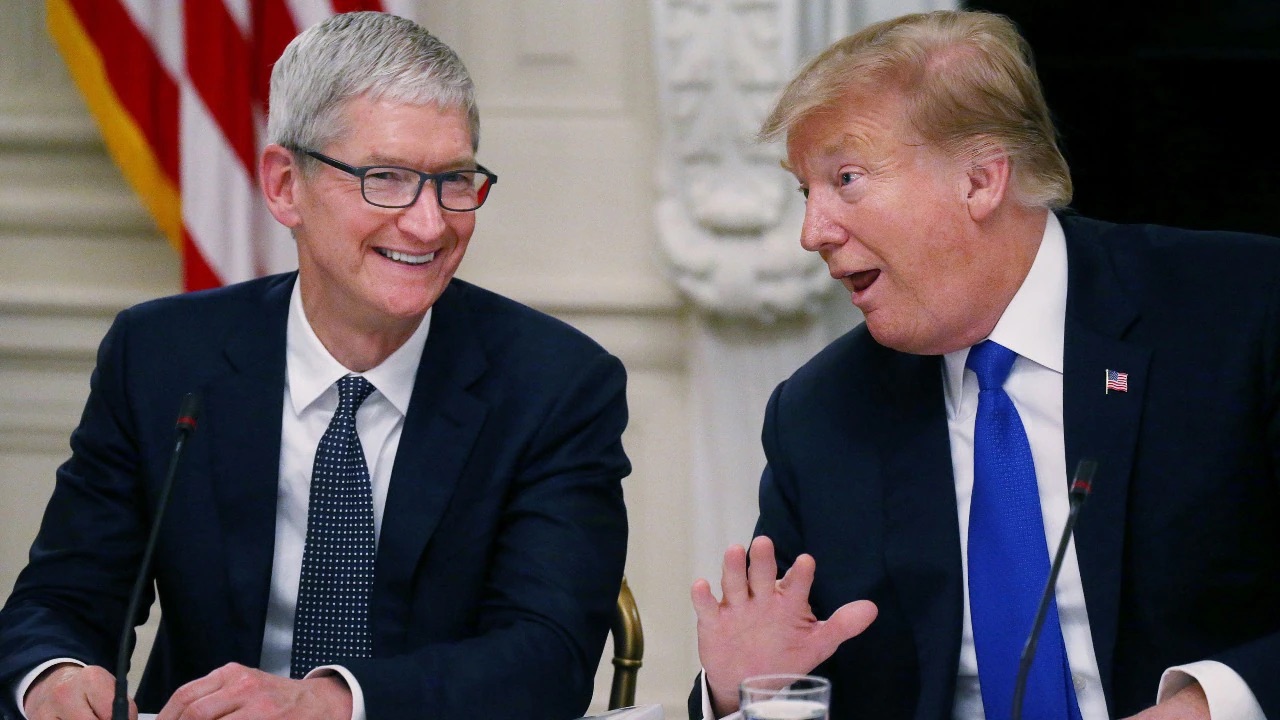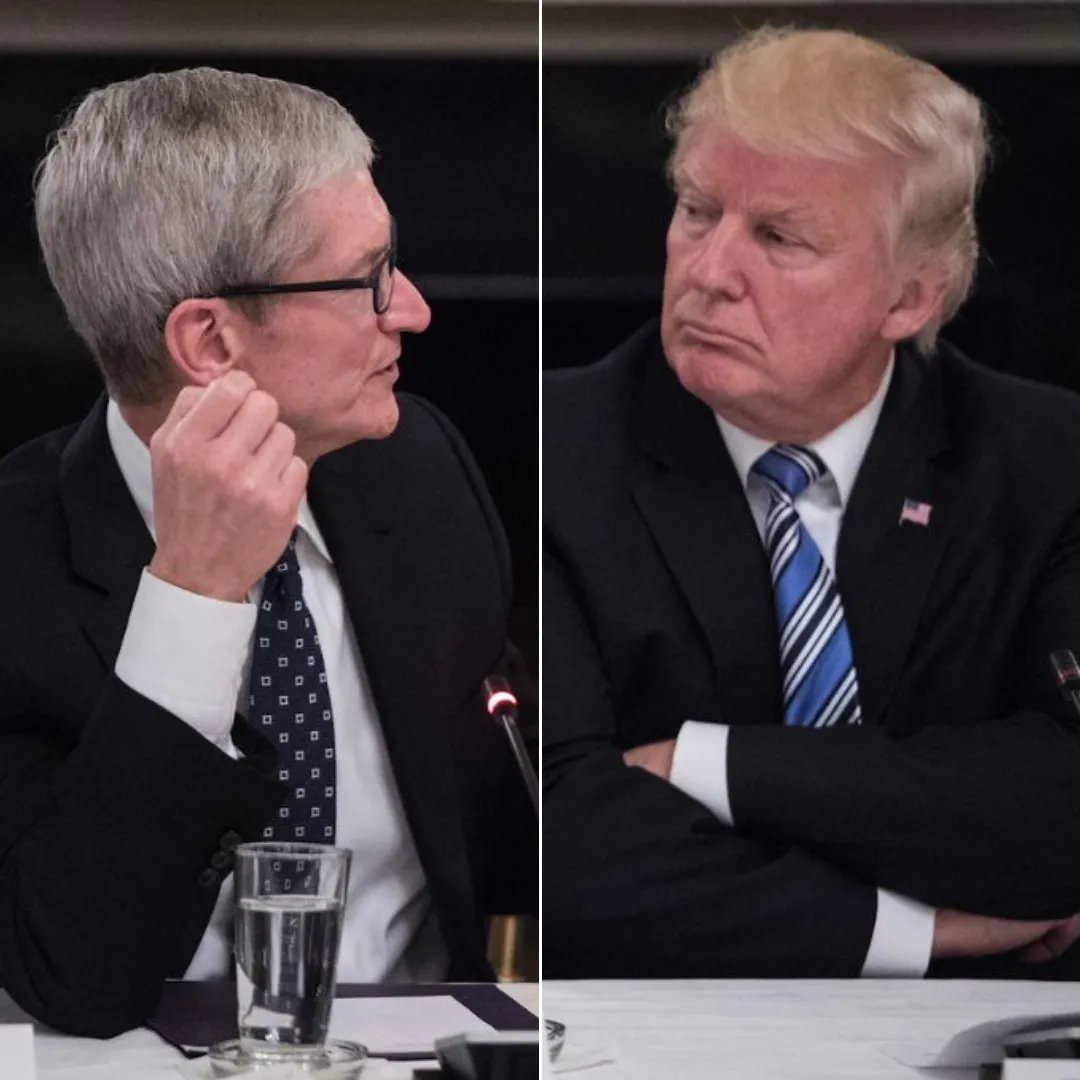
In a recent statement made during his visit to Qatar on May 15, former US President Donald Trump expressed significant dissatisfaction with Apple CEO Tim Cook regarding the company’s manufacturing plans in India. Trump revealed that he had a direct conversation with Cook, urging him to stop the expansion of Apple’s production facilities outside the United States.
Trump emphasized that despite Apple’s massive commitment to invest $500 billion into the American economy, he was concerned about the company’s growing footprint in India, explicitly stating his preference that Apple’s manufacturing remain domestic.
This public exchange highlights ongoing tensions in the tech industry regarding globalization and national economic strategies. Trump’s criticism focuses on Apple’s decision to expand its manufacturing capabilities beyond its traditional stronghold in China and into India, a move that has attracted attention from both political and economic analysts.
According to Trump, Apple promised to ramp up production within the US, a commitment that aligns with his broader agenda of revitalizing American manufacturing and bringing jobs back home. Apple’s announced $500 billion investment plan, unveiled earlier this year in February, includes ambitious initiatives such as constructing a new manufacturing plant in Houston, Texas, and launching a manufacturing academy in Michigan.

These efforts aim to foster domestic production while expanding research and development (R&D) activities across the country. The Houston facility, developed in partnership with Foxconn, is slated to produce servers supporting Apple’s Private Cloud Compute system, a critical component of the company’s artificial intelligence infrastructure. Previously, these servers were manufactured overseas.
Furthermore, Apple plans to enlarge its data center capacities in several states including North Carolina, Iowa, Oregon, Arizona, and Nevada to bolster its AI and software development efforts. The company is reportedly preparing to hire approximately 20,000 employees focused on R&D and AI development, signaling a major strategic pivot toward innovation and high-tech manufacturing within the United States.
Despite these ambitious goals, Apple’s global supply chain remains deeply rooted in China. Over the past few decades, Apple has built a vast, complex production network across the region, which has been integral to the company’s success.
However, geopolitical shifts, trade tensions, and economic diversification strategies have led Apple to seek alternative production sites. India has emerged as a key destination due to its large labor pool, lower costs, and favorable government policies aimed at attracting foreign investment.

While this diversification is strategically sound from a global business perspective, it clashes with Trump’s push for American manufacturing supremacy. His insistence that Apple halt expansion in India reflects broader nationalistic economic policies aimed at reducing reliance on foreign manufacturing and boosting domestic employment. Yet, such demands face practical challenges given Apple’s production scale and the intricate logistics of global supply chains.
Industry experts have warned that shifting significant manufacturing operations back to the US could drastically increase production costs. Apple’s reliance on economies of scale, established supplier relationships, and cost efficiencies in Asia are critical factors in keeping product prices competitive globally. Building new manufacturing facilities in the US would entail higher labor costs, stricter regulatory environments, and more complex supply logistics.
According to Dan Ives, a technology analyst at Wedbush Securities, moving production to US states such as West Virginia or New Jersey would potentially push the price of an iPhone to as high as $3,500, a stark increase compared to current retail prices.
Similarly, a report from Rosenblatt Securities suggests that if Apple were to fully absorb the cost of newly imposed tariffs and taxes by relocating manufacturing domestically, iPhone prices could soar by up to 43 percent. Neil Shah, Vice President at Counterpoint Research, echoes this view, predicting that price hikes of around 30 percent are likely.

These projections highlight the tension between political aspirations for domestic production and the realities of globalized manufacturing economics. Consumers may bear the brunt of such cost increases, potentially impacting Apple’s market share and competitive positioning.
While Apple has not officially commented on Trump’s remarks, the company’s ongoing efforts to balance global production expansion with domestic investment underscore the complexity of modern supply chains. The $500 billion investment plan signals a long-term commitment to the US economy, yet the simultaneous expansion in India suggests a pragmatic approach to maintaining cost efficiencies and meeting global demand.
This clash between political demands and corporate strategy is not unique to Apple. Many multinational corporations face similar pressures amid shifting trade policies, rising tariffs, and increasing calls for economic nationalism. Apple’s case exemplifies the broader debate on how tech giants can balance global operations with national interests and consumer expectations.
The implications of this situation extend beyond manufacturing and economics. The debate touches on questions of national identity, technological sovereignty, and the future of American industry. As Apple navigates these challenges, it must also consider how its decisions influence innovation ecosystems, workforce development, and international relations.

Moreover, the trade-offs involved in moving manufacturing domestically versus maintaining overseas production impact supply chain resilience. While local production can reduce exposure to geopolitical risks, overseas facilities offer flexibility and access to specialized suppliers. Apple’s dual approach attempts to hedge against uncertainties while capitalizing on regional advantages.
The Houston manufacturing plant’s collaboration with Foxconn represents a significant step in reshaping US industrial capacity for high-tech products. By focusing on components critical to AI and cloud computing, Apple aims to position itself at the forefront of emerging technology sectors within the US economy. This aligns with broader national initiatives to advance AI, 5G, and clean energy technologies.
Similarly, the expansion of data centers across multiple US states reflects Apple’s recognition of the growing importance of digital infrastructure. Investments in these facilities support not only consumer products but also enterprise services and cloud-based offerings that underpin the digital economy.
However, challenges remain in scaling up these initiatives. Infrastructure requirements, workforce training, regulatory compliance, and environmental considerations all demand significant attention and resources. Additionally, competition for skilled labor in high-tech sectors is fierce, requiring Apple to invest in talent development and retention.

The broader political environment, including changes in trade policies and administration priorities, will continue to influence Apple’s strategic decisions. The ongoing dialogue between corporate leaders and government officials is crucial for aligning economic goals and addressing challenges collaboratively.
In conclusion, the recent public confrontation between Donald Trump and Tim Cook over Apple’s manufacturing footprint encapsulates the tensions between political ambitions for domestic industry and the realities of globalized production. Apple’s commitment to invest $500 billion in the US signals a substantial effort to boost local manufacturing and innovation. Yet, its concurrent expansion in India highlights the complexities of balancing cost, efficiency, and market demands.
As the US grapples with economic competitiveness in a rapidly evolving technological landscape, the outcomes of such corporate-government interactions will shape the future of manufacturing, innovation, and consumer access. For Apple, navigating these dynamics is critical to maintaining its leadership position and meeting the expectations of both investors and customers in a global marketplace.
The stakes are high, the challenges immense, and the world is watching as one of the most influential tech companies in history attempts to reconcile political pressure with strategic pragmatism. The decisions made now will reverberate through the industry and economy for years to come, making Apple’s journey a defining story of the 21st century industrial evolution.



-1750951454-q80.webp)
